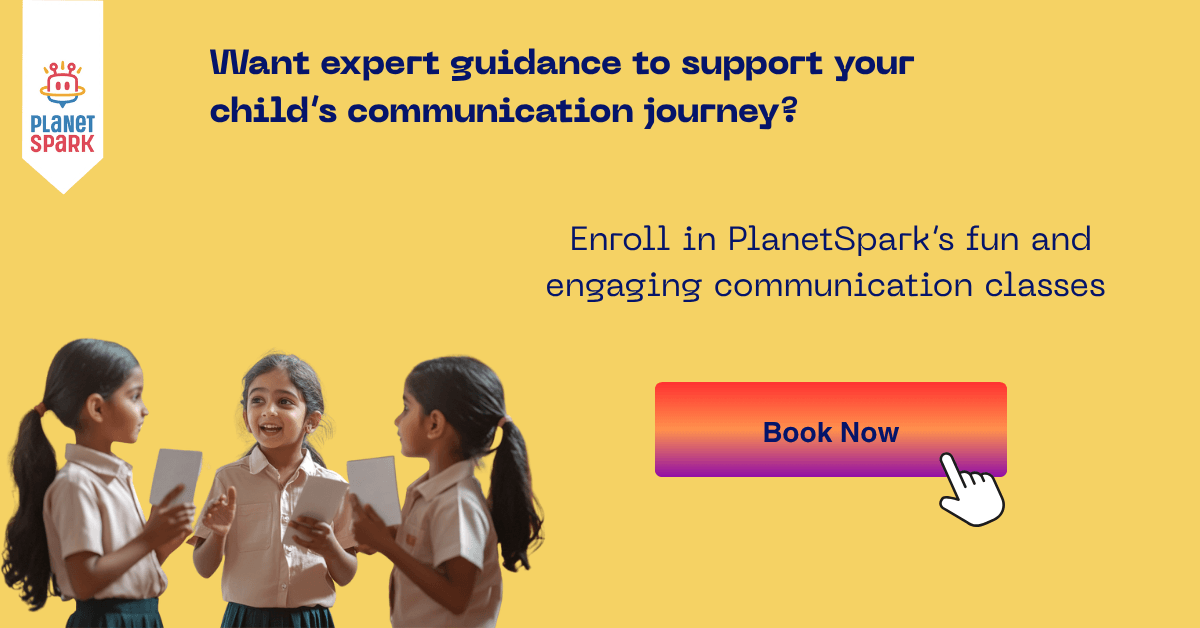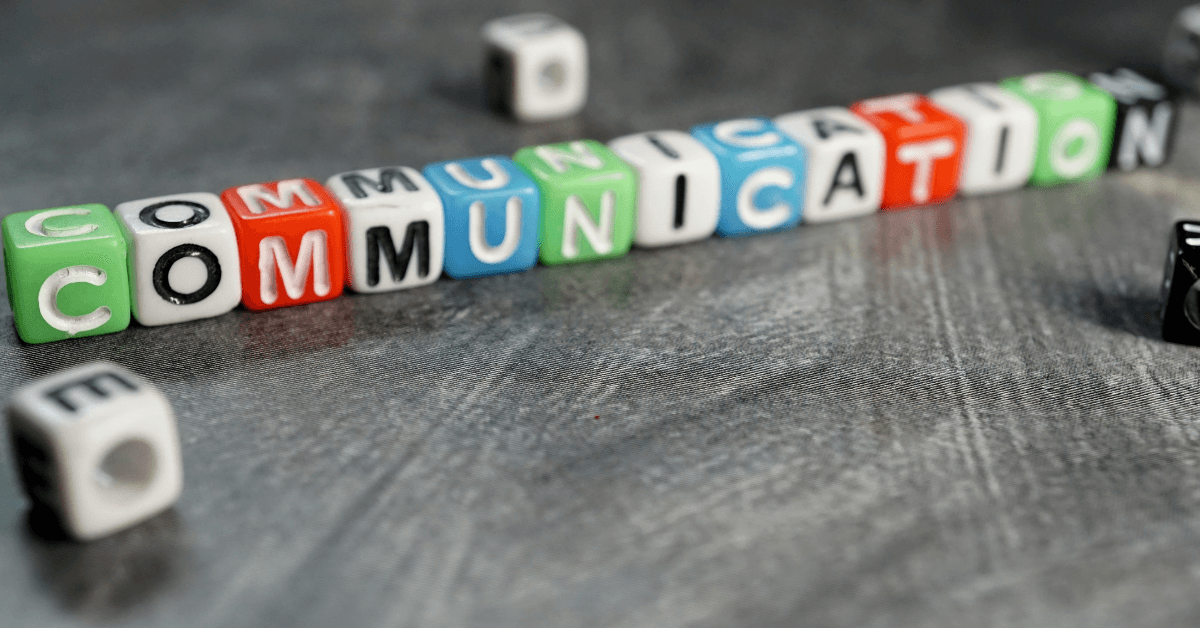10 Importance of Communication Every Student Should Know
Last Updated At: 25 Jul 2025
9 min read

Table of Contents
Whether it is a child expressing their emotions, a student giving a class presentation, or a future leader inspiring change, communication forms the backbone of personal and professional success. In this blog, we will explore what communication skills truly mean, their types, how to develop them, and the 10 most important reasons why they are vital for every child’s growth and success.
At PlanetSpark, we believe communication is not just a soft skill but a life skill. Through expert-led training programs in spoken English, public speaking, and creative writing, we equip children with the tools they need to express themselves confidently.
What Are Communication Skills?
Communication skills refer to the ability to convey or share ideas, thoughts, feelings, and information effectively. These skills include both the expression and the understanding of messages through various forms spoken, written, visual, or non-verbal.
Strong communication skills enable individuals to:
- Speak clearly and confidently.
- Listen actively and empathetically.
- Write and read effectively.
- Interpret and express body language appropriately.
Children with good communication skills are better equipped to express themselves, understand others, resolve conflicts, and build meaningful relationships.

10 Importance of Communication
Let's deep dive into 10 importance of communication that every student must know:
1. Builds Self-Confidence
Communication helps children express their thoughts clearly and assertively, helps in building self-confidence. When a child can share their opinion, ask questions, and interact with peers and adults comfortably, they feel more secure and valued.
2. Strengthens Relationships
Whether it's bonding with friends, understanding teachers, or engaging with family, communication is the glue that holds relationships together. Clear and respectful dialogue promotes empathy and helps resolve conflicts peacefully.
3. Enhances Academic Performance
Children who communicate well often excel academically. From answering questions in class to participating in group discussions or writing coherent essays, effective communication translates into better academic outcomes.
4. Promotes Emotional Intelligence
Being able to express emotions verbally and non-verbally allows children to better understand themselves and others. Emotional intelligence, which is crucial for long-term happiness, depends heavily on communication.
5. Fosters Leadership Skills
Leaders inspire, guide, and influence others through their words and actions. Communication is the foundation of leadership. From school captains to future CEOs, those who speak with clarity and conviction are the ones who lead.
6. Improves Problem-Solving Skills
Effective communication encourages open-mindedness. Children who are taught to listen actively and articulate their thoughts find it easier to navigate challenges, both in school and life.
7. Enables Better Decision-Making
Children with good communication skills are more likely to make informed decisions. They gather inputs, ask questions, evaluate alternatives, and express their choices clearly.
Communication Shapes Success-Start Early
Don’t wait for confidence to build on its own. Empower your child to communicate with clarity and impact.
Book a Free Trial Class today!
8. Prepares for Future Careers
In every profession, from teaching and medicine to entrepreneurship and tech, communication is key. It determines how well one can present ideas, lead teams, or engage with clients. Starting early ensures children are ready for tomorrow’s competitive world.
9. Increases Participation in Social and Extracurricular Activities
Children who communicate well tend to participate more in school debates, plays, sports, and other co-curriculars. These experiences further enhance personality and teamwork.
10. Supports Mental Health
When children can talk about their feelings, fears, and challenges, they are less likely to bottle up emotions. Communication is a powerful tool for self-expression and mental well-being.
Types of Communication

Understanding the different types of communication is essential to developing a well-rounded skillset. These types include:
Verbal Communication
This includes the use of spoken or written words to share information. It comprises:
- Conversations
- Public speaking
- Presentations
- Storytelling
Non-Verbal Communication
This involves conveying messages without words. Examples include:
- Facial expressions
- Body posture
- Gestures
- Eye contact
- Tone of voice
Visual Communication
This type uses visual aids to convey ideas. It includes:
- Graphs and charts
- Infographics
- Pictures and drawings
Listening Skills
Active listening is a core part of communication. It involves focusing, understanding, and responding thoughtfully to what others are saying.
Master Every Form of Communication
From verbal fluency to body language and written clarity your child deserves to shine in every format of expression.
Enroll in a Free Trial Class to unclock full communication potential!
The Dual Nature of Communication: Verbal and Non-Verbal
Communication is not limited to words. In fact, over 70% of communication is non-verbal. Let’s delve deeper into why both aspects matter.
Importance of Verbal Communication
Verbal communication includes speaking and writing. It helps children:
- Share ideas clearly.
- Argue or debate respectfully.
- Engage in discussions.
- Improve vocabulary and grammar.
Good verbal communication improves comprehension, boosts clarity in thought, and helps children express themselves effectively in academics and beyond.
Importance of Non-Verbal Communication
Non-verbal communication includes facial expressions, gestures, posture, eye contact, tone of voice, and even silence. It's essential because:
- It conveys emotions more powerfully than words.
- Helps in reading others' feelings and responding empathetically.
- Builds trust and enhances message delivery.
- Supports and strengthens spoken words.
For instance, maintaining eye contact while talking shows confidence and interest. A slouch during a presentation might convey disinterest, even if the words are perfect.
Try Communication Skill Test (CST) to assess the level of fluency in communication.
How to Develop Communication Skills in Children
Communication is a skill that can be nurtured through conscious effort and the right environment. Here’s how parents and educators can help:
- 1. Encourage Open Conversations: Give children space to talk about their day, feelings, and opinions without judgment. Make time to sit with them and ask open-ended questions like "How was your day?" or "What did you enjoy most today?" This builds trust and teaches children that their voice matters.
- Practice Active Listening: Show genuine interest when your child speaks. Make eye contact, nod in agreement, and respond thoughtfully. This models respect and shows that good communication is a two-way process.
- Promote Reading and Storytelling: Reading books enhances vocabulary, improves sentence formation, and introduces children to various speaking styles. Storytelling, on the other hand, allows kids to express imagination, sequence thoughts, and communicate creatively.
- Engage in Role-Playing and Games: Activities like debates, elocution, drama, and interactive storytelling help children become more articulate. These games promote voice modulation, emotional expression, and spontaneous thinking.
- Offer Constructive Feedback: When children make errors in speaking or writing, use it as a learning opportunity. Instead of correcting harshly, rephrase sentences, suggest better words, and appreciate the effort. Feedback should empower, not discourage.
- Lead by Example: Children observe and imitate adults. Practice respectful, clear, and empathetic communication at home. Handle disagreements calmly, resolve conflicts through dialogue, and praise honest expression.
Read here the detailed guide on How to Improve Communication Skills to get more tips for all ages.
Why Choose PlanetSpark to Build Communication Skills?
At PlanetSpark, we’ve designed every lesson to ensure children don’t just learn to talk—but learn to speak with purpose, confidence, and impact. Here's how we help:
- Live, Interactive Classes with expert trainers that simulate real-life communication settings.
- Personalized Learning Paths based on your child’s strengths and areas of improvement.
- Structured Curriculum that includes public speaking, creative writing, grammar, vocabulary, and debate.
- AI-Powered Feedback that helps track progress with fluency and pronunciation reports.
- Regular Showcases where children participate in speech contests, storytelling events, and live presentations.

Conclusion
Communication is not just about talking. It’s about connecting, understanding, expressing, and growing. From the classroom to the boardroom, it is the superpower that shapes personalities and destinies.
Investing in communication training for children is one of the most impactful steps parents can take today to ensure a bright future tomorrow.
Must read blogs:
5 Benefits of PlanetSpark’s Communication Skills Course for Class 9 Kids!
FAQs: 10 Importance of Communication:
Q. Why is it important to develop communication skills in children?
A. Communication skills are essential for children because they form the foundation of effective learning, relationship-building, and emotional expression. Children with strong communication skills are better able to share their thoughts, understand instructions, resolve conflicts, and collaborate with peers. These skills also enhance their confidence and are crucial for success in both academic and future professional environments.
Q. At what age should communication skill development start?
A. Communication development should ideally begin in early childhood, around the age of 3 to 4. At this stage, children begin forming complete sentences and expressing their ideas more clearly. Early exposure to conversations, stories, and structured language activities supports the development of vocabulary, listening skills, and social interaction. The earlier these skills are nurtured, the more naturally they develop.
Q. What are some effective ways to improve communication skills in children at home?
A. Parents can foster communication by encouraging daily conversations, engaging in storytelling, reading together, playing word games, and asking open-ended questions. Creating a judgment-free zone where children feel safe expressing themselves is key. Role-play scenarios and family discussions are also great ways to teach active listening and respectful speaking habits.
Q. Can shy or introverted children also become good communicators?
A. Yes. Shyness or introversion doesn’t mean a child lacks communication potential. With the right support, safe spaces, and positive reinforcement, even the most reserved children can develop strong communication abilities. Activities like creative writing, guided reading, or one-on-one speaking practice can help ease anxiety and build self-assurance gradually.
Q. Are online programs effective in developing communication skills for children?
A. Online programs, when designed thoughtfully, can be just as effective as in-person sessions. They offer flexible access to expert instructors, interactive tools, and personalized learning paths. Many platforms incorporate games, storytelling, real-time feedback, and live participation to make communication practice both engaging and impactful. For many families, online learning also provides the added benefits of safety, convenience, and time efficiency.
Download Free Worksheets
Personalized Communication Report
Record a video to get a AI generated personalized communication report for your child
Select Learner's Class

Hi There, want to try these
tips for your child with
LIVE with our expert coach?
Let's check your child's
English fluency

